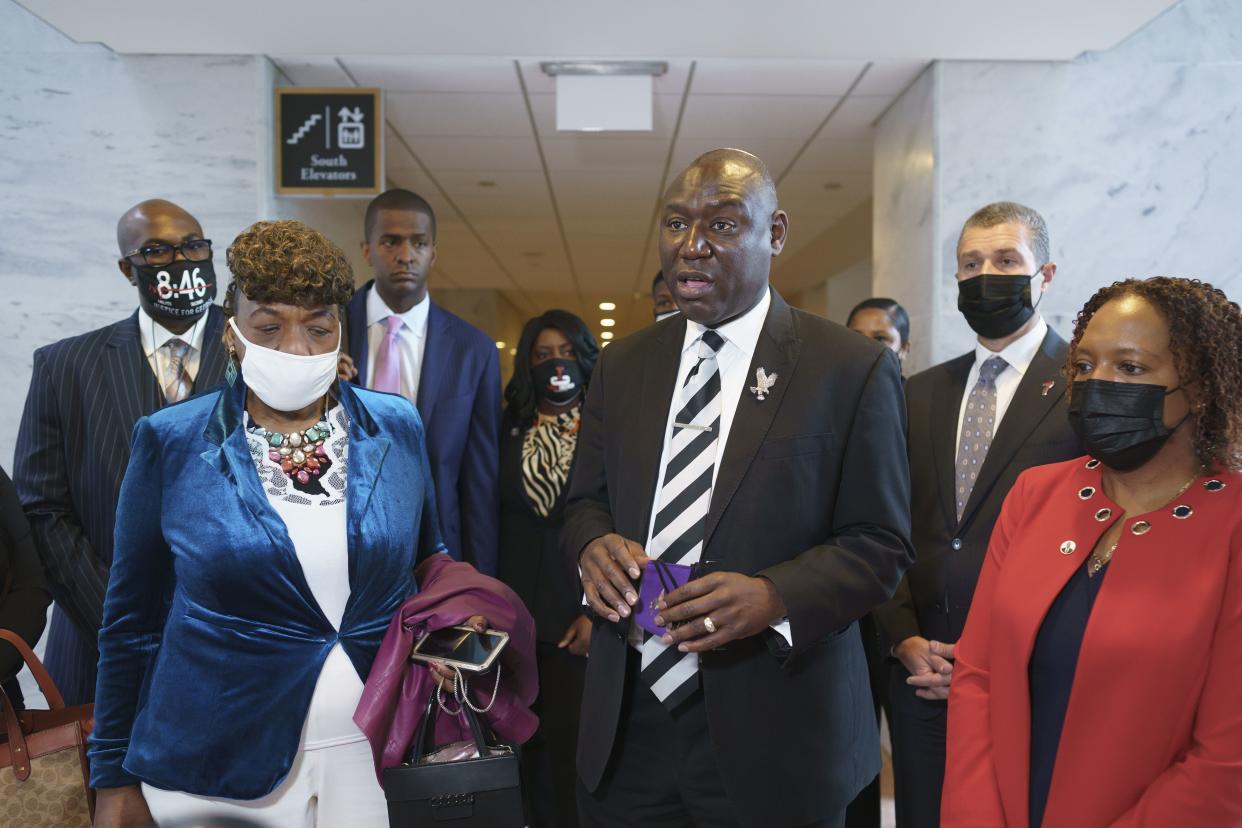‘Stop killing us’: Eric Garner’s mom meets congressional lawmakers amid growing demand for police reform
Gwen Carr and other relatives of Black Americans killed by cops met with lawmakers Thursday on Capitol Hill in a push for rapid passage of a sweeping police reform bill, ramping up pressure one day after President Biden set a firm deadline for action on the high-stakes issue.
Carr, whose son Eric Garner died after an NYPD officer put him in a now-illegal chokehold on Staten Island in 2014, was joined by Philonise Floyd, the brother of George Floyd; Alissa Findley, the sister of Dallas police murder victim Botham Jean, and other advocates for back-to-back meetings with both Democrats and Republicans.
The issue on the table was the George Floyd Justice in Policing Act, a wide-ranging piece of police reform legislation that passed the House last month and is awaiting action by the Senate.
In a major boost for the reform effort, Biden said in his first joint congressional address Wednesday night that the Senate must pass its version of the bill by May 25, the one-year anniversary of Floyd’s death at the hands of former Minneapolis police officer and since-convicted murderer Derek Chauvin.
The family members took heart in Biden’s support as they sat down for their first meeting of the day with Senate Majority Leader Chuck Schumer (D-N.Y.), who has pledged to put the bill up for a vote.
“He was talking to us on a positive note about this bill,” Carr told reporters after sitting down with Schumer. “We feel that if this bill is passed, that it will be something that all Americans, all America can benefit from, and I think we got a good chance at this bill being passed. ... We’re asking for accountability, we’re asking for transparency, and we are asking for them to stop killing us.”

Philonise Floyd, who gave tearful testimony at Chauvin’s murder trial this month, echoed Carr’s sentiment and said the bill named after his brother is about preventing future tragedies.
“We need to let everybody know how we feel about our brothers and our families and family members who have been killed for anything that they shouldn’t have been killed for,” he said. “We’re hurting. We’re still in pain.”
The Floyd-honoring bill would make it easier for federal and state authorities to investigate and prosecute police misconduct, and also create a national database cataloging instances of police brutality.
Additionally, the bill would on a federal level outlaw chokeholds such as the one that resulted in Garner’s death, implement higher restrictions on use of force by police overall and mandate bias training for officers, among other measures.
Many Republicans are onboard with the general gist of the bill, but a sticking point has emerged over a provision that would end so-called qualified immunity for police.
The immunity law makes it nearly impossible for victims of police misconduct to sue individual officers, and reform advocates say that incentivizes bad behavior.
Republicans counter that ending qualified immunity would have a chilling effect on the police profession and are trying to cut out that provision before the bill comes to a vote in the Senate.
After the Schumer meet, Carr and the other family members met with some Republican senators, including Lindsey Graham and Tim Scott, both of South Carolina, who have been critical of ending qualified immunity.
Scott, the only African-American Republican in the Senate, declined to tell reporters whether he believes a deal can be reached on qualified immunity.
“I’m always optimistic that progress is possible,” he said.
Some progressive Democrats in the House, meantime, said qualified immunity is a red line.
“Let me be clear: it’s not the George Floyd Justice in Policing Act if the Senate strips out qualified immunity,” tweeted Missouri Rep. Cori Bush, whose chamber would have to approve any modifications made by the Senate. “Police must not be allowed to kill us with impunity. Let’s work together to make that clear, POTUS. I will not vote for it if ending qualified immunity comes out.”
Biden has not made clear whether he considers the qualified immunity component negotiable, though he voiced openness to compromise in his Wednesday night address.
“I know the Republicans have their own ideas and are engaged in productive discussions with Democrats. We need to work together to find a consensus,” he said. “Congress should act.”
